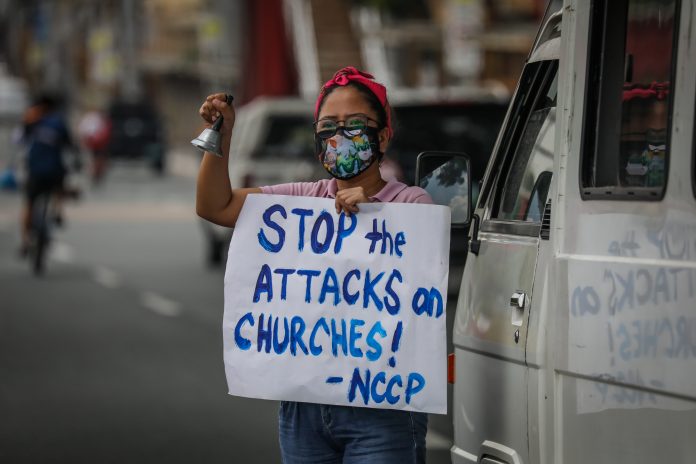THE Catholic Church believes that the role of government is to protect and promote the common good and part of its commitment to uphold the life and dignity of the human person is to oppose all forms of injustice and oppression.
That, I think, is what motivates the Church in the Philippines to speak with one voice against the proposed anti-terrorism bill that’s likely to be signed by President Rodrigo Duterte soon.
The House of Representatives passed the Anti-Terrorism Act of 2020 on June 3 after Duterte certified the bill as urgent.
The proposed law allows the government to wiretap suspects, arrest them without warrants and detain them for 14 days, among other provisions.
If passed into law, the bill would repeal the Human Security Act of 2007 that imposes fine of P500,000 on law enforces for each day they wrongfully detain a suspect.
First to raise their collective voice against the proposed law was the group calling itself “One Faith, One Nation, One Voice”, composed of prominent Church leaders. They said this would “cause a further shrinking of democratic space and weakening of public discourse that will be detrimental to our nation.” I fully agree.
Two bishops on Negros island in central Philippines followed suit.
Bishop Patricio Buzon of Bacolod said that while he respects the responsibility of the government to protect Filipinos from acts of terrorism, it should do so without sacrificing human rights: “The crafting of this draconian piece of legislation is an assault on our right to be consulted on matters of state policies that gravely impact the lives of our people and democracy.”
Bishop Gerardo Alminaza of San Carlos said the measure “will unmask who are the true defenders of human rights and the poor and who are not.”
“We shall put the burden of its consequences on the consciences of its authors and those who did nothing,” said Alminaza. “Our challenge is to stay vigilant, engage key players in meaningful dialogues and critical collaboration and use our God-given gifts to be a positive force to achieve our shared goals,” he added.
For Bishop Jose Collin Bagaforo of Kidapawan and national director of Caritas, the social action arm of the Catholic Church, the proposed anti-terrorism law could “further reinforce tyranny and totalitarianism.”
“We cannot let this happen. This is not only intolerable, this is inhuman, unjust and unlawful,” the prelate said.
Bishop Bagaforo urged Filipinos not to allow the government to curtail their democratic rights: “The anti-terror bill violates the rights of our people and makes a mockery of our Constitution.”
Bishop Ruperto Santos of Balanga warned that the “truth will be the first casualty” of the proposed law.
Bishop Arturo Bastes, retired prelate of Sorsogon, said Congress seemed to have become “too subservient to the president to whom many of them owe their political position…I am sure that with the bill turned into law, Duterte will have a heyday violating human rights with impunity.”
An ecumenical peace organization agrees with the view that the anti-terror bill will further exacerbate red-tagging and human rights violations in the country.
The Philippine Ecumenical Peace Platform (PEPP) also expressed dismay that the proposed legislation would adversely affect the possible resumption of the cancelled peace negotiations between the government and the communist rebels.
The Association of Major Religious Superiors in the Philippines (AMRSP) also warned that acts of dissent, free speech, right to assemble, the right to organize, and freedom of belief are threatened by the proposed anti-terror law, and expressed deep concern over what it described as “troubling developments” even amidst the coronavirus pandemic.
The Church is correct in taking a united stand against the anti-terrorism bill which I think will only lead to virtual martial law, since the police and the military can conduct warrantless arrests of critics of the administration and detain them for an extended period of time than is allowed by our existing laws and the Constitution.
The Anti-Terrorism Bill of 2020 is another step backward for Philippine democracy that can only lead us to the dark days of dictatorship. No doubt about it, this is part and parcel of what appears to be creeping martial law, with the government not even needing to make a formal declaration of emergency rule.
Ernesto M. Hilario writes on political and social justice issues for various publications in the Philippines. The views and opinions expressed in this article are those of the author and do not necessarily reflect the official editorial position of LiCAS.news.









